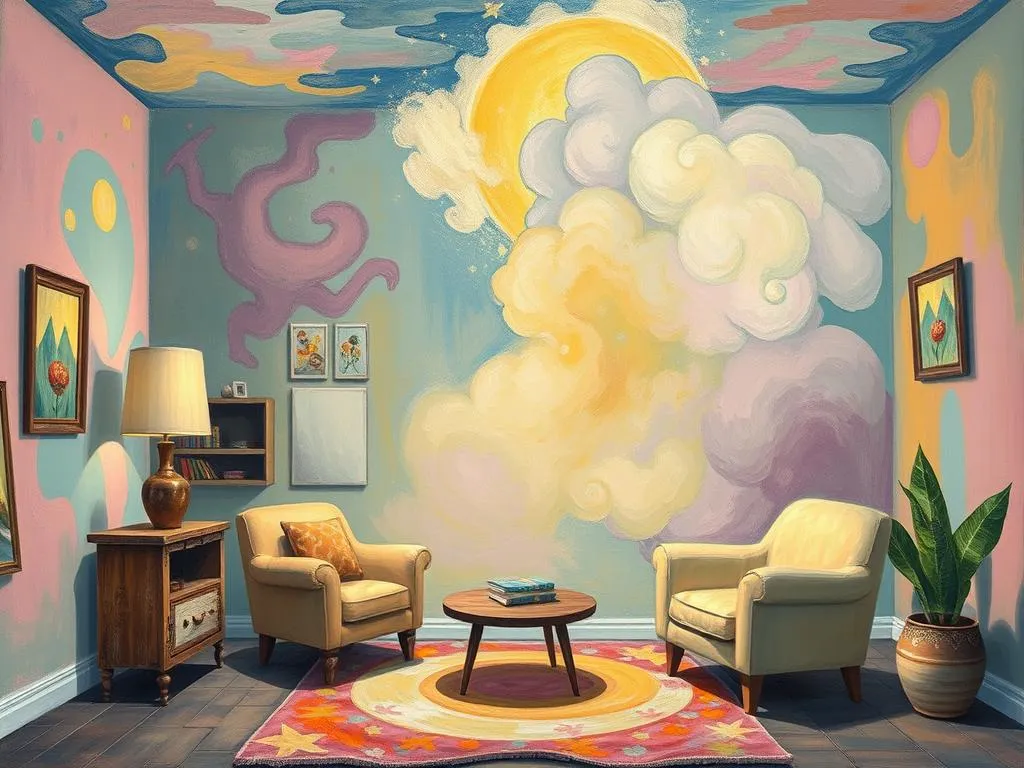
Dreams have a magical way of drawing us into their depths, often leaving us with lingering feelings and questions upon waking. Imagine stepping into a familiar room—perhaps the living space from your childhood, or a cozy nook in your current home. It feels safe yet oddly unsettling, as if it holds secrets you haven’t yet uncovered. What do these dreams mean? Why do we find ourselves wandering through these regular rooms, and what can they teach us about our waking lives?
Understanding the symbolism of rooms in dreams opens up a portal to our subconscious. These spaces can reflect not only our personal history but also our current emotional state and aspirations. Let’s embark on this journey together, blending cultural perspectives and psychological insights to unlock the deeper meanings behind your dreams of regular rooms.
Room Reflections: A Symbolic Space
When it comes to dream interpretation, rooms serve as powerful symbols that can reveal much about our inner worlds. In dreams, a room often represents a part of the self, reflecting our thoughts, emotions, and experiences. Each room has its unique characteristics and can embody various aspects of our personalities.
For instance, a well-lit room filled with vibrant colors may symbolize joy, creativity, and openness. Conversely, a dark and cluttered room might suggest feelings of confusion, anxiety, or even unresolved issues that need addressing. This duality illustrates the complexity of our inner lives and how our subconscious processes experiences.
Culturally, different societies have ascribed varied meanings to rooms in dreams. In Eastern traditions, for instance, a room can signify the mind’s landscape—its harmony or turmoil reflecting your mental state. Meanwhile, in Western psychology, rooms often represent the psyche’s compartments, with each space symbolizing different aspects of identity, such as childhood, relationships, and personal growth.
The concept of boundaries also plays a crucial role in the symbolism of rooms. A room with closed doors may indicate feelings of restriction or a desire to hide from certain truths, while an open room suggests acceptance and readiness to explore new possibilities. As you reflect on your dreams, pay attention to the condition and characteristics of the rooms you encounter, as they can provide valuable insights into your current emotional landscape.
Inside the Dream: Scenarios Unpacked
Let’s dive deeper by examining a few scenarios that illustrate the myriad experiences one might have in a dream involving a regular room. Each scenario offers a unique lens through which to analyze your feelings and intentions.
Scenario 1: The Childhood Bedroom
You find yourself standing in your childhood bedroom, surrounded by toys and posters from years gone by. The air feels nostalgic yet bittersweet.
Interpretation: This dream often signifies a longing for the past or unresolved childhood emotions. It may be a call to reconnect with your inner child, addressing any lingering insecurities or joys that shaped who you are today.
Scenario 2: The Open Door Mystery
You walk into a familiar room, but a door you’ve never noticed before catches your attention. As you approach it, your heart races with curiosity and apprehension.
Interpretation: This scenario suggests new opportunities or paths in your life that you may have overlooked. The door symbolizes potential—something waiting to be explored or discovered. Reflect on areas in your life where you might be holding back and consider taking that leap of faith.
Scenario 3: The Flooded Room
You enter a room only to find it filled with water, rising rapidly around you. Panic sets in as you search for a way out.
Interpretation: Water in dreams often represents emotions. A flooded room can indicate overwhelming feelings or situations that you feel are out of control. It might be time to assess your emotional well-being and seek ways to navigate through your feelings, whether that means seeking support or finding healthy coping mechanisms.
Scenario 4: The Empty Room
You step into a vast, empty room with white walls and no furniture. The silence is deafening, and you feel a sense of isolation.
Interpretation: An empty room can symbolize feelings of emptiness or a lack of direction in your life. It may also indicate the need for introspection and self-discovery. Use this dream as an opportunity to reflect on your desires and the changes you wish to make to fill your life with meaning.
Scenario 5: The Cluttered Room
You find yourself in a room overflowing with boxes and belongings, making it hard to navigate.
Interpretation: A cluttered room often reflects mental or emotional clutter in waking life. It can signify unresolved issues or stress that needs to be addressed. This dream serves as a reminder to declutter not just your physical space but also your mind, allowing for clearer thoughts and a more peaceful existence.
Embracing Change: Growth Through Reflection
Now that we’ve explored the symbolism and various scenarios involving regular rooms in dreams, let’s shift our focus to personal growth. Dreams are not just reflections of our subconscious; they can also serve as powerful guides for change and transformation.
Recognizing the messages behind your dreams is the first step towards self-awareness. Reflecting on the themes and emotions present in your room dreams can lead to insights about your current life situation. Are there areas where you feel stuck? Are there memories from the past that need healing? By addressing these questions, you can begin to make meaningful changes in your life.
Incorporating practices like journaling can enhance your understanding of these dreams. Take time to write down your dreams upon waking, noting the details and feelings associated with each room. Over time, patterns may emerge, providing clarity on recurring themes and issues that need attention.
Moreover, consider engaging in mindfulness practices to ground yourself in the present. Meditation can help clear mental clutter, allowing you to navigate your thoughts and emotions more effectively. By creating a space for introspection, you can foster a deeper connection with your inner self.
Finally, remember that you are not alone in this journey. Sharing your dreams with trusted friends or a therapist can provide additional perspectives and insights. Others may offer interpretations or support that you hadn’t considered, helping you to uncover deeper layers of meaning.
In summary, dreams of regular rooms serve as a mirror reflecting our emotional landscapes, histories, and aspirations. They invite us to explore our inner worlds and encourage growth through self-reflection and action.
As you navigate your dreams, let them be a source of guidance and inspiration. Embrace the lessons they offer, for they hold the keys to deeper understanding and transformation.
What will you choose to explore today?







